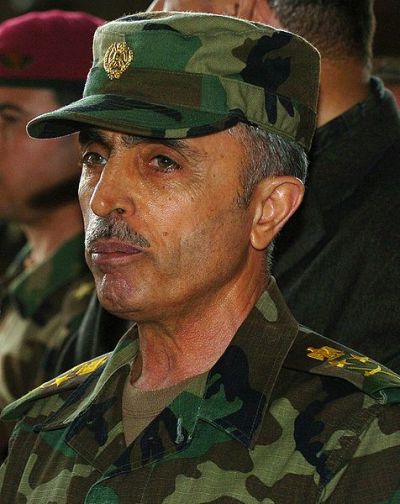Airstrike Kills 3 Top ISIS Militants Including Right-Hand Man of ISIS Leader

The top aide to the Islamic State's head leader was killed along with two other senior ISIS militants in an airstrike in the Ninewa province, the Iraqi Defense Ministry confirmed Thursday.
While NBC News is reporting that senior security officials confirmed that a U.S. airstrike carried out the attack, Iraqi Army General Arm Babaker Zebari claims it was an Iraqi warplane that killed the member of leader Abu Bakr al-Baghdadi's inner circle, Abu Hajar al-Suri, in ISIS, also known as ISIL, stronghold of Tal Afar just west of Mosul.
"Iraqi warplanes carried out a security operation today, resulting in the killing of ... Abu Hajar al-Suri," General Babaker Zebari told Agence France-Press.
Zebari said the attacks were "based on accurate intelligence information." He confirmed that their target had been killed.
While reports surfaced initially that ISIS leader al-Baghdadi was killed as well, Pentagon officials have heavily denied that rumor. The two other senior militants reportedly killed in the airstrike were the terrorist group's military leader for the Tal Afar region and the other was an explosives operative.
Pentagon Spokesman Col. Steve Warren couldn't confirm the deaths and said the U.S. hasn't targeted militant leaders. However, he added that if ISIS leaders were included in "troop formations" that were targeted by a U.S. airstrike they are likely to be killed.
Although the U.S. may not have contributed to the death of al-Suri, the U.S. and Iraq have been heavily involved in preventing ISIS advances by way of airstrikes, with the U.S. conducting over 100 airstrikes of ISIS-controlled areas since early August. The killing of the three senior ISIS militants marks a minor victory for the U.S. and Iraq, but ISIS still has a tight stronghold in other regions and could spread as it continues to recruit internationally and grow in size.
President Barack Obama said he wants to make the confrontation with ISIS more "manageable" by including the help of other nations to help "shrink" the militant group. ISIS has taken control of various regions in Syria and across the northern Sunni heartland in Iraq.
After lobbying for more help from the U.S.' international allies, U.S Secretary of State John Kerry announced in Wales on Friday from the NATO summit that a coalition of about 10 countries has been established to combat ISIS on a global front. The coalition includes France, Germany, Canada, Australia, Denmark, Poland, Turkey, Italy and Britain.
"In many ways I believe ISIL presents us with an opportunity," Kerry said. "It's an opportunity to prove that we have the ability to come together, that our capacities of defense are not so frozen in an old model that we can't respond to something like ISIL, that we can't pull ourselves together and effect a coalition of clearly the willing and the capable to be able to deal with ISIL."
Meanwhile, back in the U.S., Obama still needs to get Congressional approval to further escalate conflict in Syria. While it is still uncertain whether or not Obama will send ground troops to Iraq and Syria, any kind of airstrike that the president would like to have executed against ISIS troops in Syria would need Congressional approval.
As more members of Congress from both parties are urging Obama to put an ISIS plan in front of the lawmakers to vote on, Obama administration officials will brief Congress on what will be "required to defeat" ISIS next week when Congress returns from their recess, House Majority Leader Kevin McCarthy (R-California) said. The lawmakers will also be briefed by outside security experts.
"These hearings and briefings will be absolutely critical in helping us take the appropriate steps necessary to achieve our objective: the defeat of our terrorist enemies," McCarthy wrote in a memo highlighting the House GOP fall agenda. "I believe that it is critical that we confront and defeat ISIL and like-minded terrorists who directly threaten America. I – and I know many of you – have personally called on the Administration to address this growing national security challenge."




























